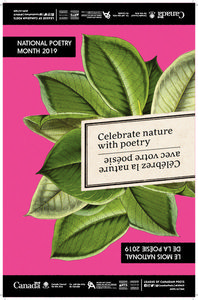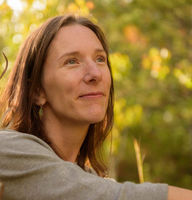Poetry Au Naturel: Poets Tell us About Their Nature-Themed Favourites for National Poetry Month
The theme for National Poetry Month 2019 is "celebrate nature with poetry". While nature poetry might have a reputation as sleepy and traditional, great writers have often mined the natural world for inspiration to create works that are far from quiet. We asked some of the talented poets we know to share their favourite nature-centric poems (or lines or images) to show once and for all that nature is as complex, fascinating, dark, funny, and just plain awesome an inspiration as any other. We got an incredible response, showcasing love for poems by the late Patrick Lane and Gwendolyn MacEwan, Tomas Tranströmer, e.e. cummings, and many more.
Read on to hear from Heather Cadsby, Edward Carson, Kate Cayley, Susan Gillis, Catherine Graham, Shazia Hafiz Ramji, Clea Roberts, Erin Robinsong, Stuart Ross, Gillian Sze, and Matthew Tierney about their favourite nature-themed poems.
Heather Cadsby
"October" by Patrick Lane
I admire the way this poem flows. It moves from specific images (bagging potatoes; curled black vines) to generalizations (wandering and women) while maintaining the same power. Also, the poem travels through change of season smoothly, avoiding clichéd language, into its final two lines.
Heather Cadsby is the author of Standing in the Flock of Connections (Brick Books, 2018)
Edward Carson
"Corsons Inlet" by A.R. Ammons
. . . I was released from forms,
from the perpendiculars,
straight lines, blocks, boxes, binds
of thought
into the hues, shadings, rises, flowing bends and blends
of sight:
Ammons was a master wordsmith and observer of nature throughout his life. This early (1962/63) poem is on its surface a simple walk by the poet through the dunes and shoreline of Corsons Inlet. Deeper into it, though, one can readily see a larger purpose addressing poetic issues of form and content, nature and art, organic and mechanical form.
Edward Carson is the author of Look Here Look Away Look Again (McGill-Queen's University Press, 2019)
Kate Cayley
"Loveliest of Trees, the cherry now" by A. E. Houseman
I struggled with this as a "pick:" it is old-fashioned, self-consciously so, even when it was written, and it isn't really about nature, but about mortality. Looking at the tree, and the perfection of the tree (the swoop of the first line) is a reminder of how few springs there will be, and to take the time to look at the tree. Yet the poem is written by a man who, I think, didn't spend very much time looking at trees, who was a committed nostalgist, a refuser of life, which has always been, for me, one of the problems of writing: how writing is a form of detachment, of removal, even as you strive to see. But you do see the cherry tree.
Kate Cayley is the author of Other Houses (Brick Books, 20)
Susan Gillis
"Outskirts" by Sue Goyette
One poem I often return to is Sue Goyette's "Outskirts" from the book of the same name. Not what you might think of first as a nature poem, it connects me, confronts me even, with what it means to inhabit the natural world: so often that includes trying to defeat or displace it. Or at the very least, to ignore it. The cost of this -- to ourselves, to the earth -- is immense and devastating; the poem, playful, loving, and chilling, all at the same time.
Your CanLit News
Subscribe to Open Book’s newsletter to get local book events, literary content, writing tips, and more in your inbox
Susan Gillis is the author of Yellow Crane (Brick Books, 2018)
Catherine Graham
“Dark Pines Under Water” by Gwendolyn MacEwen
“There is something down there and you want it told.”
This land like a mirror turns you inward
And you become a forest in a furtive lake;
The dark pines of your mind reach downward,
You dream in the green of your time,
Your memory is a row of sinking pines.
Explorer, you tell yourself, this is not what you came for
Although it is good here, and green;
You had meant to move with a kind of largeness,
You had planned a heavy grace, an anguished dream.
But the dark pines of your mind dip deeper
And you are sinking, sinking, sleeper
In an elementary world;
There is something down there and you want it told.
I have known the poem “Dark Pines Under Water” by Gwendolyn MacEwen for over twenty years. It continues to affect me. A sense of place weaves with the subterranean world in a way that holds the poem’s fluidity like surface tension. When the forest and reflection meet, it’s a hinge, a portal to insight through dream and memory. That haunting last line dazzles electric with its dare—to tell what needs to be told. Now.
Catherine Graham is the author of The Celery Forest (Wolsak and Wynn, 2017)
Shazia Hafiz Ramji
Ghazal V by John Thompson
"Sudden rain is sweet and cold. What darkens
those winds we don't understand?"
The enjambment and syntax of the question creates a mystical understanding of the poem. This is to say that the question is about what darkens those winds – it is not about our understanding of the winds or the way the wind works. It is about something beyond and greater than both.
Shazia Hafiz Ramji is the author of Port of Being (Invisible Publishing, 2018)
Clea Roberts
"Invasive Species" by Claire Caldwell
(excerpt from the suite of poems titled "Grizzly Woman”)
Descent
I arrive like a drug
plunged through a central line.
Amber, translucent. Flushed
into Kaflia a third season,
rust-flecked hills spread
like a girl’s legs.
From the seaplane, the alders
are a fistful of curls. Tim sprouts:
mustard seed, dandelion, life-sized.
In the maze, survival’s an illusion
of scale: you’re bear of blackfly.
The floats kiss the lake.
I love Claire Caldwell’s suite of poems “Grizzly Woman” because they provide a unique perspective on the natural world—a world that simultaneously contains and expels us. The poems are written in the voice of Amie Huguenard, who along with her boyfriend, Timothy Treadwell (the unorthodox, self-proclaimed bear “researcher”), was killed and eaten by grizzly bears at Kaflia Bay, Alaska in 2003. in "Grizzly Woman,” Caldwell pours ego into eco with swift, startling movements and renders the northern wilderness exquisitely through compact, unexpected images. Caldwell’s poems amplify and give voice a version of Amie Huguenard, and by doing so, allow us to speculate on the forces that brought her to the wild and precipitated her death.
Clea Roberts is the author of Auguries (Brick Books, 2017)
Erin Robinsong
"Save the World" by Ariana Reines
(from Mercury, excerpt below)
I am in line with the natural order
And the harangues in my mind are aligned with this order
Venturing into the sun to smoke
I am proof of nature and all its declarations.
I verify; express its clarity
Without speaking or trying I ultimate all history.
When I sleep it is enclosed in hot nights of nature
And when I shudder I do so naturally.
When I kill myself I do so inside the mind of nature
I go against nature inside of nature
Enclosed in my body, disclosed when I emit
The secret features of my familiars.
Inside of nature and passing away.
All faults crack open upon the round world
To describe themselves
Upon me
It is through this mesh
Of faults that I see
It is through this mesh of faults
That I see
That I see that I see that I see
It is only through this mesh of faults
That I see
That I see
That I see
I admire this poem for its clear expression of what seems so difficult for Western culture to comprehend, that there is no separation between "nature" and me; no outside, or beside, or away, or apart.
Erin Robinsong is the author of Rag Cosmology (Book*hug, 2017)
Stuart Ross
"Fall Sky" by Nelson Ball
Swallows
dart
back and forth
like
hyphens
on grey paper
awaiting
words
In 12 words, 8 lines, 5 stanzas, Nelson Ball — in one of his very few uses of a simile — fuses both nature and poetry-writing so vividly. Every word, every line break, in this poem is crucial to its success. The first three lines are fast and frenetic, and then, with poetry invoked, the poem slows right down to the beautiful, meditative "awaiting/words" conclusion, suggesting that the poem isn't even yet written. What poet doesn't stare into a grey sky until a poem emerges?
Stuart Ross is the author of Motel of the Opposable Thumbs (forthcoming, Anvil Press, spring 2019)
Gillian Sze
"in Just–" by e. e. cummings
This is such a playful, festive, and accurate depiction of the first peeks of spring. After a long winter, it's no surprise that all of the "eddieandbills" and "bettyandisbels" come running out to a "mud/lucious" world. I appreciate this poem more now that I have kids. Nothing like watching a three and a half year old jumping around in rain-boots, yelling "puddle-wonderful!" and making a few Peppa Pig references.
Gillian Sze is the author of Panicle (ECW Press, 2017)
Matthew Tierney
"Winter's Gaze" by Tomas Tranströmer
The nature found in a Tomas Tranströmer poem is my kind of nature: estranged, awesome, gothic, and numinous. Whether it’s a valley “full of crawling axe-handles,” or “moonlight jellyfish,” or mushrooms as “fingers, stretching for help,” his images conjure an otherworld that may or may not include us. A poem like “Winter’s Gaze” captures both the ache and the remove; we have been wandering an “ancient sewage system” for months, goes the poem, and then this:
Brief devotions when some hatchway opens above us
and a weak light falls.
We look up: the starry sky through the grating.
Matthew Tierney is the author of Midday at the Super-Kamiokande (Coach House Books, 2018)
_________________________________
For more information on National Poetry Month, visit the League of Canadian Poets website














